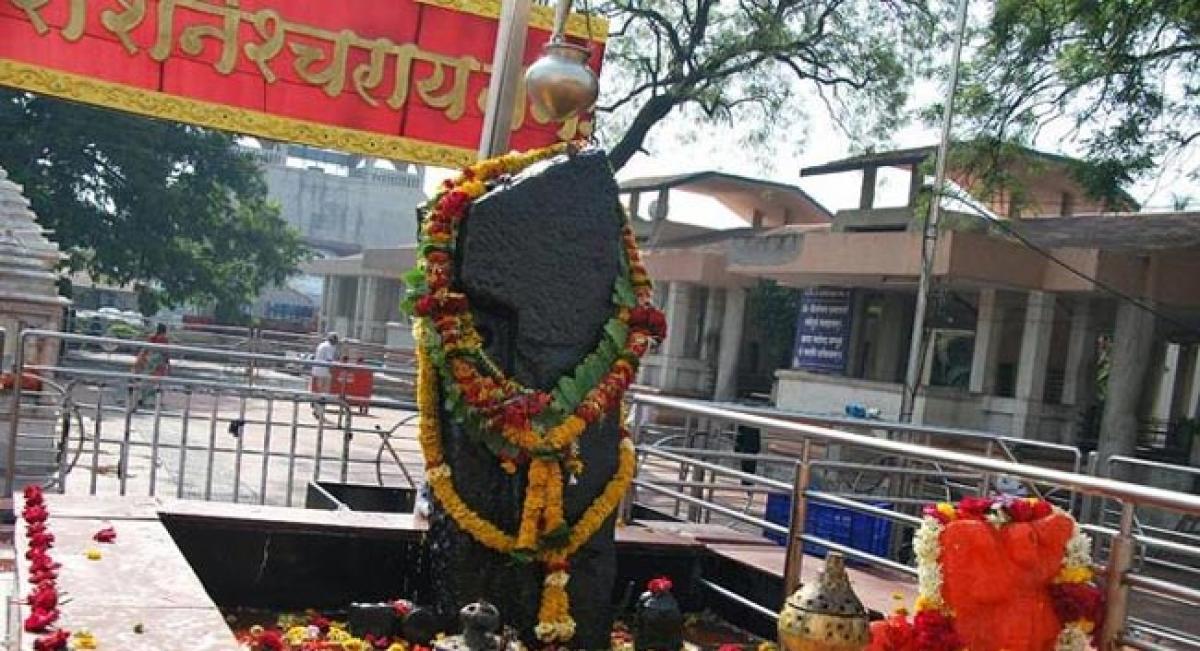Live
- Mandal Level CM Cup Sports Concludes in Ija with Promising Talent and Enthusiastic Participation
- Harish Rao Slams Revanth Reddy: "More Talk, Less Action"
- Revolutionising Oil and Gas: Gaurav Kumar Sinha’s AI-Driven Innovations Transforming Efficiency and Profitability
- Vishal Jain to head AiDASH facility
- Congress Central Election Committee has finalised the names of around 20 candidates for the upcoming Delhi Assembly elections
- District Collector Adarsh Surabhi has ordered to expedite the land acquisition process related to irrigation projects in the district
- Economics and Public policy gets new platform in Bengaluru
- Residents Demand Action After Accidents Highlight Poor Road Safety Measures
- Rahul Gandhi Visits Hathras Victim's Family, Slams BJP For Injustice
- Nitin Gadkari Admits India's Road Safety Crisis, Urges Change In Human Behavior And Infrastructure
Just In
Shani Shignapur row: No religion can discrimate against women's right to worship


It\'s a common trend that where social, political and religious systems fail, the judiciary steps in - as in the case of the entry of women to the Shani Shingnapur temple.
It's a common trend that where social, political and religious systems fail, the judiciary steps in - as in the case of the entry of women to the Shani Shingnapur temple.
A centuries-old bastion of the patriarchal social construct was smashed to smithereens. The women activists from the Bhumata Brigade, led by Trupti Desai, were successful in entering the sanctum sanctorum of the Shani temple. Trupti hailed the decision of Shani Shingnapur temple trustees to open the gates of the sacred chabutra (platform) for men and women devotees, and said it was a prudent step on their part.
"Der aayad, durust aayad!" said a spirited Trupti and hoped the trustees at the Trimbakeshwar and Mahalaxmi temples in Nashik and Kolhapur too would follow suit to treat women devotees at par with men.
One would congratulate Trupti for her stoic resistance as it was after her activism that TV debates were generated and many storms raised in teacups besides the national print media highlighting the issue.
Priyanka Jagtap, another member of the Bhumata Brigade, celebrated the court's observation at the temple premises by distributing sweets. "It's a big victory for all the womenfolk of Maharashtra and the country. It is an occasion to celebrate," she said.
The main question that needs to be asked is whether this outburst of activism against ritualistic practices in Hindu temples is a legitimate effort to break the almost 400-year-old tradition.
What's unfortunate is that most religions talk about gender equality, but it is either totally defunct or reduced to lip-service as totem. The question is whether it is the followers of Hinduism or Islam or any other religion,who vie with one another to deprive their women of equal rights.
The aim of these lines is to convey a message to the custodians of women's rights - the men - to remind them of the cultural traditions that are mired in gender discrimination. In this context, whether it is Shani Shingnapur, Haji Ali Baba or Kerala's Sabarimala temple, all these famed religious places have banned the entry of women.
Politically, the BJP has been accused of vitiating the atmosphere in Sabarimala. However, it would be preposterous to suggest that all villagers in this temple town are BJP or right-wing activists. According to social commentator Sreemoy Talukdar, the patriarchal mores lie so deep that even women (and probably more so) were the first ones to take umbrage of the 'breach' which they fear will bring calamity on their families.
Talukdar feels that Kerala's Sabarimala temple authorities have stuck to their stand - in the face of legal scrutiny from the Supreme Court of banning all women between the ages of 10 and 50 from entering temple precincts citing ritualistic practices and traditions.
They claim Lord Ayyappa, who attracts more than 50 million devotees each year, is a sworn celibate. They do not want the apex court to interfere in religious practices.
In Mumbai's Dargah Haji Ali Baba, it is really something totally inexplicable that women are not allowed to enter the sanctum sanctorum in spite of the fact that Islam has granted equal rights to woman. During the days of Prophet Mohammed (PBUH), Muslim women used to go to the mosque to pray. However, after him, some myopic and orthodox Muslims asked women to stay at home.
Nevertheless, the larger question is about the general exploitation of women by men from all religions.
They are not given their rights and, at the slightest provocation, are maltreated, beaten, divorced and even murdered.
Trupti's campaign - that of challenging the patriarchal hegemony over religion, its practices and ending stigmas against women - would only materialize truly if the activism continues.
By Firoz Bakht Ahmed
(The author is a grandnephew of Maulana Azad and a commentator on social and cultural issues. The views expressed are personal. He can be contacted at [email protected])

© 2024 Hyderabad Media House Limited/The Hans India. All rights reserved. Powered by hocalwire.com






